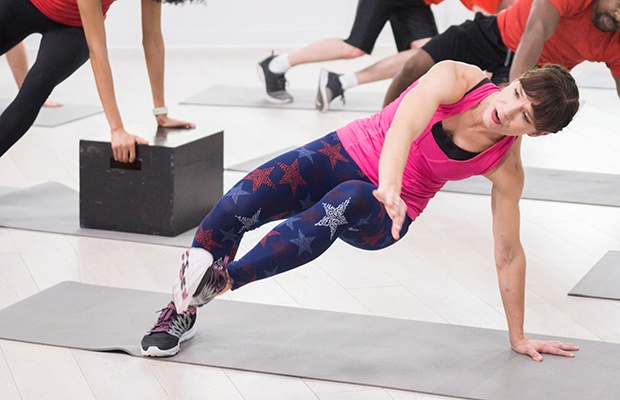When you think about what running really entails, it’s actually a single-leg sport. You run with two feet, but it’s the big, long strides that help you go the distance. “A stride in running is essentially a shifting single-leg hop,” says Cheri Paige Fogleman, trainer and certified run coach.
So why are single-leg exercises the best type of strength training exercises for runners? They closely mimic the work required for running. “Often, we have one leg stronger than the other, and when we work single-leg style, we take away the possibility of one leg helping the other along,” Fogleman explains.
Get a Leg Up on Your Training
Whether you want to PR your next race or finally address those muscle imbalances, now is the perfect time to incorporate more single-leg exercises into your workout repertoire. Going single-leg also requires coordination and balance — two essential skills that will help you run more efficiently. Not to mention, at the end of a race, you’ll need as much strength and power from each leg to help you sprint to the finish line. “Single-leg moves are great for non-runners, too, as walking and going up and down stairs all require single-leg strength,” Fogleman says. Read on for Fogleman single-leg workout.
30-Minute Leg Workout for Runners
Whether you’re running a 10K or half-marathon, these single-leg drills will help fire up your core, quads, glutes and hamstrings. Because when fatigue really sets in during a race, you’ll rely on these muscles to help you maintain form and charge through the finish line. Do eight to 10 reps for each exercise for four rounds.
1. Single-Leg Deadlift
During a sprint, you want to cover as much ground as possible in the least amount of time. “That action of quickly pushing the ground away behind you is achieved by rapidly firing the hamstrings and glutes,” Fogleman explains. These single-leg deadlifts are a great way to both strengthen and lengthen your hamstrings and glutes.
How to: Stand with your feet together with your hands at your sides. If you want to take things up a notch, hold a dumbbell in each hand (a). Shift your weight to your right foot and keep your right knee slightly bent for support. Then, extend your left leg behind you and hinge forward at the waist, keeping your spine long and straight. Avoid rounding your back (b). Lower your hands until your back is parallel to the ground, and then return to the starting position (c). Alternate sides.
2. The Clam
Weak glute medius and minimus muscles can cause hip instability, which leads to IT band friction, a common issue among runners. “When our hips are stable, these glute muscles prevent the knee from collapsing inward,” Fogleman says.
How to: Lie on your right side with knees bent and prop yourself up on your right forearm into a modified side plank (a). Square your hips and place your left hand at your waist, so your body forms a diagonal line from the top of your head to the ground (b). Engaging your core, glutes and thighs, rotate your left leg open. Keep the knee bent and hips square to form a diamond (c). Then, bring the left leg back down to the starting position (d). Repeat on the left side.
3. Pistol Squats
As one of the most challenging squat variations, it’s important to practice these simple progressions before you tackle the real deal. “Even if you’re only descending and ascending a few inches, or have your forward heel on the ground, you still benefit from the focused strength work of squatting,” Fogleman says.
How to: Stand with your feet hip-distance apart and hands by your sides (a). Shift your weight to your left side and lift your right foot off the floor with your chest up, back straight and your left knee slightly bent (b). Sit into a squat by hinging your hips back and extending your right leg in front of you, so it’s parallel to the ground. At the same time, bring your hands in front of you (c). Once you reach the bottom of the movement, begin standing back up to the starting position with control (d). Repeat on the right foot.
4. Breakdancer
In addition to engaging your core, the breakdancer helps strengthen the adductors, as one leg swings under and across your body while the other one stabilizes. You’ll also hone your coordination skills with this move. “The breakdancer requires a connection through the obliques to swing one arm in opposition to the striding leg. This is the same coordination we use when walking or running,” Fogleman says.
How to: Get into a tabletop position with your shoulders directly over your hands and knees bent on the floor (a). Lift your knees an inch off the ground (b). Then, lift your right hand off the ground, and rotate your hips so you kick your left leg out to the side to touch your right hand (c). Repeat on the left side.
5. Single-Leg Glute Bridge
If you have muscle imbalances, this exercise is for you. This single-leg glute bridge will tone up your glutes and hamstrings on both sides. “When you raise your toes, you strengthen the anterior tibialis, which is a muscle that can help keep shin splints at bay,” Fogleman says.
How to: Lie on your back with your knees bent and feet flat on the floor (a). Lift your left leg up to make a right angle with the floor and raise your hips off the ground, while your right knee remains bent (b). Pulse your left leg up and down without dropping your hips. Be sure to flex your left foot and press down on your right heel (c). Switch sides.









